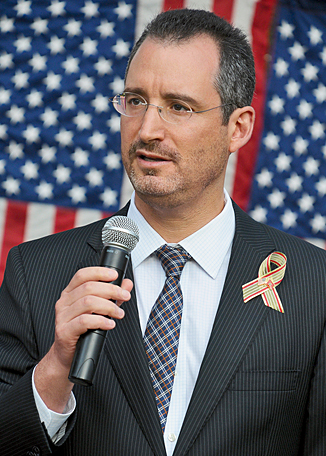
Brian Shukan, JD ’94, lives with his family in Casablanca, Morocco, in a historic house where Winston Churchill stayed during the 1943 Casablanca Conference while discussing World War II strategy with world leaders, including Franklin Roosevelt and Charles de Gaulle. As the U.S. consul general in charge of the American consulate in the storied Moroccan city, Shukan’s responsibilities are often representational in nature. This means he maintains a heavy schedule of speaking and social engagements with local business, government and community leaders. “Our job is to build relationships and advance U.S. interests, by engaging with as broad a cross-section of society as possible,” he notes.
But it’s not all garden parties. His duties also include promoting trade in Morocco’s largest city and commercial capital (with 4 million people); engaging in outreach with Moroccans from all walks of life; managing operations at a 66-person consulate that includes personnel from the departments of State, Homeland Security and Commerce; and overseeing consular services in Morocco. This involves assisting Americans living and traveling in Morocco, and overseeing the visa process for Moroccans wishing to travel to the United States.
“I’ve had to spend several years without my family. That was tough, but service in difficult and dangerous locations, including war zones, has become a fact of life in today’s Foreign Service.”
—Brian Shukan
Raised in Longmeadow, Mass., Shukan studied history and philosophy at the University of Wisconsin–Madison before earning his law degree from Washington University in 1994. Though he doesn’t practice law, he says the critical thinking techniques he acquired in St. Louis have served him well. Working at the U.S. Embassy in Riyadh, Saudi Arabia, and later as Saudi Arabia desk officer at the State Department in Washington, D.C., he was involved in negotiations to return detainees from Guantanamo Bay. He has also assisted Americans involved in complicated international child-abduction cases. “Having that [law] background gave me the skills and confidence to deal with these kinds of issues,” he says.
Shukan has served in seven countries since joining the Foreign Service in 1995; his two teenage daughters were born abroad. Though he says they wouldn’t trade the experiences, there have certainly been challenges. During his time in Saudi Arabia, frequent threats and attacks against Westerners — including the terrorist bombing of three Western housing compounds in Riyadh in 2003 and the 2004 attack on the American consulate in Jeddah — led the State Department to evacuate families. He later spent another unaccompanied assignment at the American Embassy in Baghdad, Iraq. “I’ve had to spend several years without my family,” he says. “That was tough, but service in difficult and dangerous locations, including war zones, has become a fact of life in today’s Foreign Service.”
Considering the violence and upheaval in the Middle East since Shukan’s August 2011 arrival in Morocco — including the killing last year of the U.S. ambassador in Benghazi, Libya — the country has been fairly stable. Even with demonstrations near the consulate, Shukan says, “We have taken precautions, but the local authorities have managed things well and provided good support to U.S. diplomats.”
Morocco and the U.S. have long had close relations. It was (little-known fact) the first country to officially recognize an independent United States, in 1777. Today, American commerce with the former French colony is growing; among the 200 U.S. companies in Morocco are McDonald’s, General Motors, Citigroup, Coca-Cola and Dell, which has 2,000 employees in a Casablanca call center, where most customer-service questions from French-speaking countries are routed.
Shukan speaks French himself, actually — which he mainly uses to communicate in Casablanca — and in the fall he gave speeches on the American election for locals in the language. (He speaks Arabic, too, though not the regional dialect.) Indeed, though his life may not have the intrigue of the 1942 film Casablanca, it’s undoubtedly exciting and even a bit daring. In the house where Winston Churchill once slept, a bit of mystique can’t help but remain.
Ben Westhoff, AB ’99, is a freelance writer based out of Los Angeles.
Comments and respectful dialogue are encouraged, but content will be moderated. Please, no personal attacks, obscenity or profanity, selling of commercial products, or endorsements of political candidates or positions. We reserve the right to remove any inappropriate comments. We also cannot address individual medical concerns or provide medical advice in this forum.